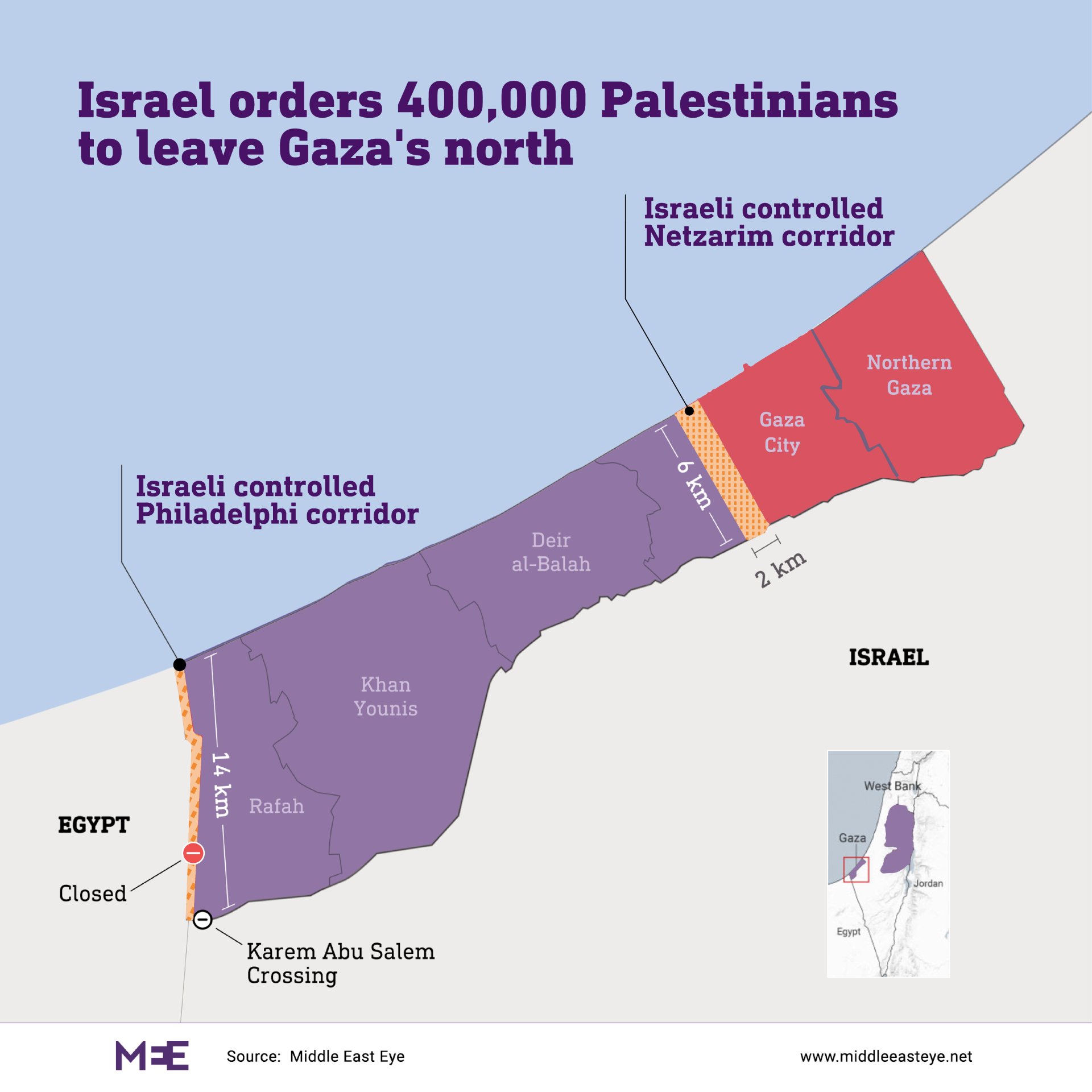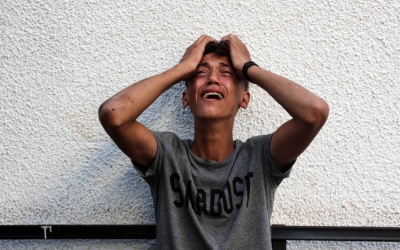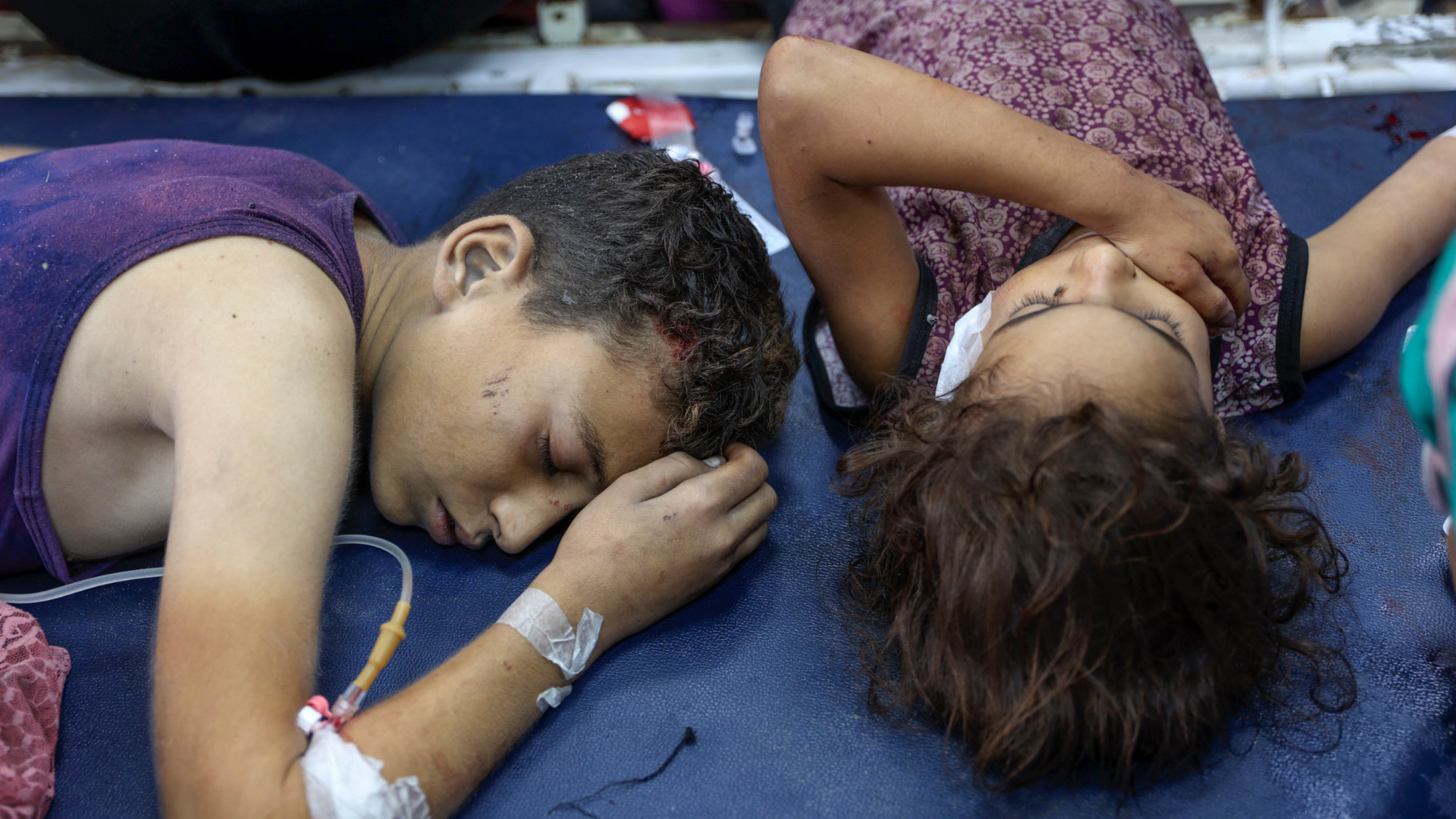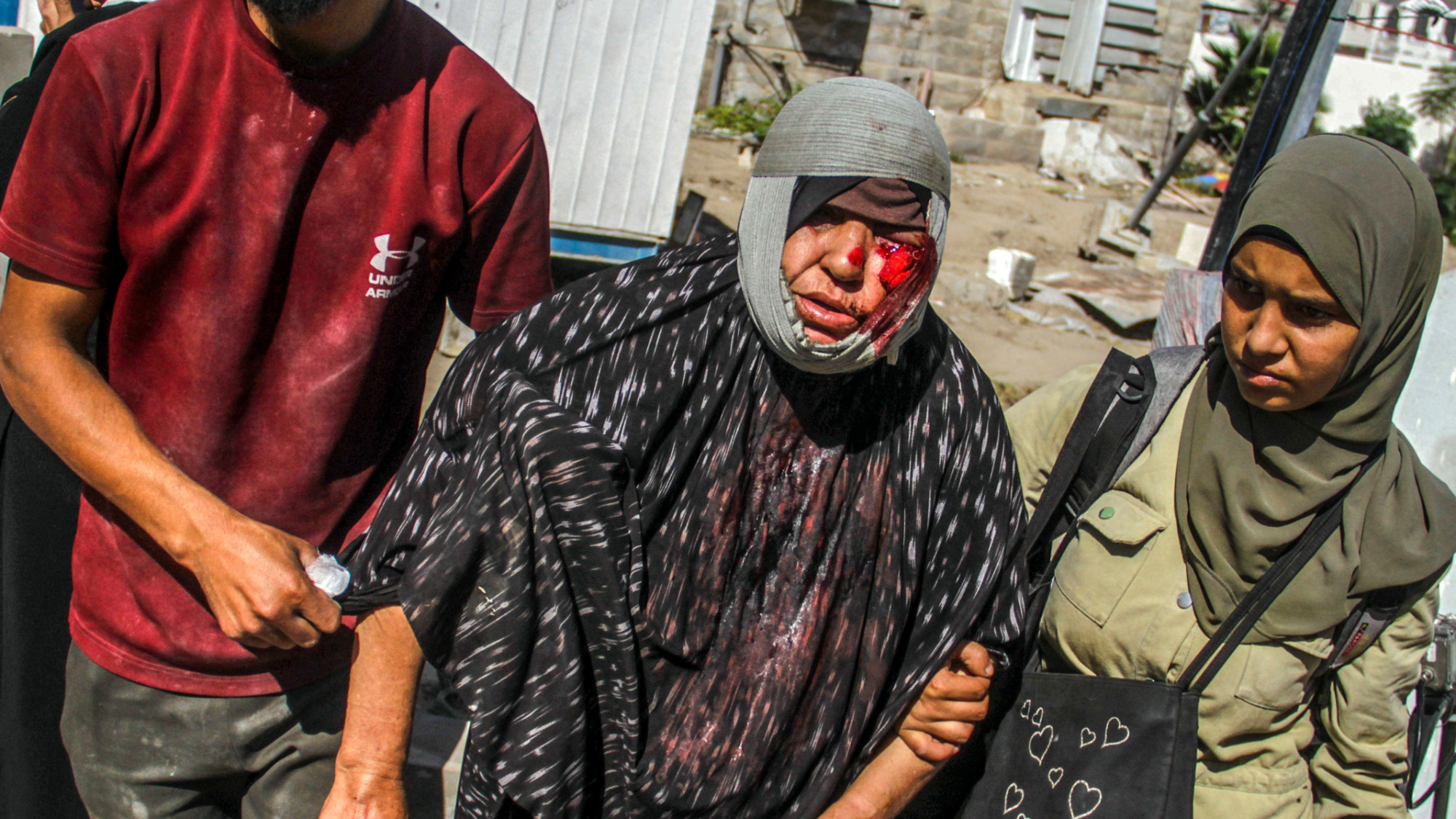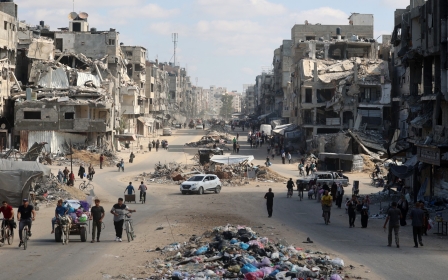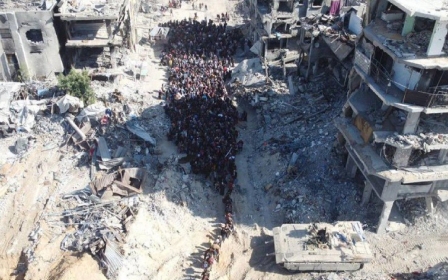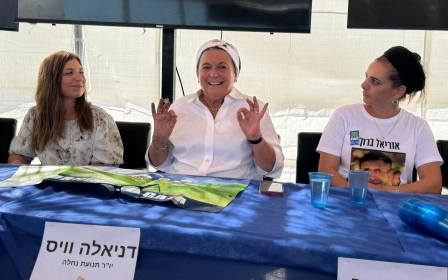Half of Jabalia ethnically cleansed by Israeli army as schools burned and men kidnapped
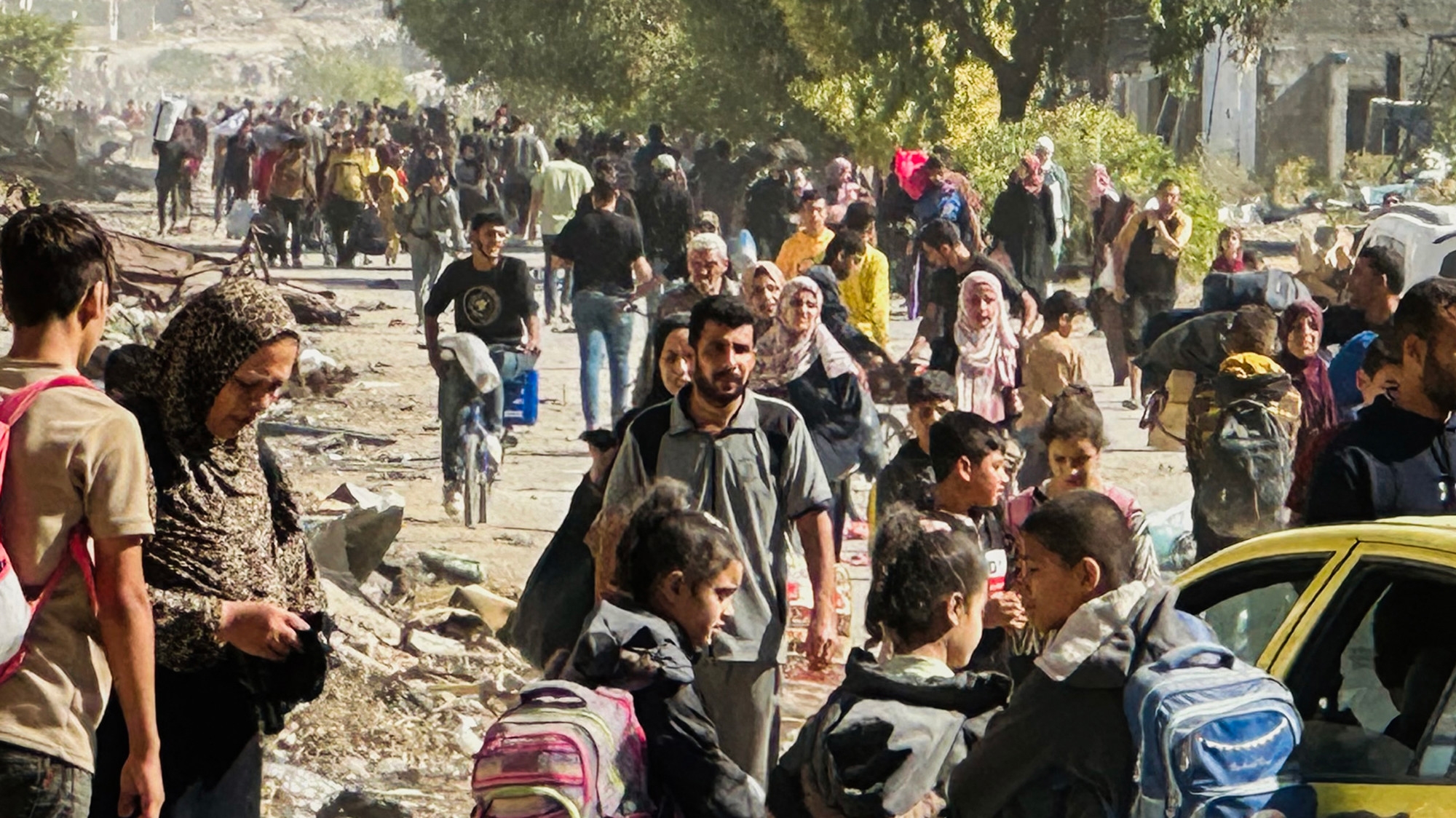
Israeli troops are going school to school in Jabalia and nearby areas to forcibly remove unarmed, starved and besieged Palestinian civilians from their homes as the military campaign to ethnically cleanse north Gaza nears its third week, eyewitnesses have told Middle East Eye.
Under the cover of heavy air strikes and artillery shelling, large Israeli ground forces directly and systematically attack homes and buildings used as shelters by displaced families, forcing everyone out at gunpoint.
The buildings, including UN schools and houses, are subsequently either razed or burned by Israeli soldiers to prevent people from returning.
Troops then separate men from women, before taking them to humiliating field interrogations and later abducting many of them to unknown locations.
Women and children are forced to head south of Jabalia refugee camp. Some were bombed and killed as they fled, according to media reports.
New MEE newsletter: Jerusalem Dispatch
Sign up to get the latest insights and analysis on Israel-Palestine, alongside Turkey Unpacked and other MEE newsletters
Refusing to comply with Israeli orders, many of them went west of Jabalia to Beit Lahia while others arrived at the nearest points in the adjacent Gaza City.
'I will only leave Jabalia a dead body, no other way'
- Yahya, Jabalia resident
Hasan*, a resident of the north Gaza, said he saw scores of bodies strewn across the streets in Jabalia as civil defence teams and paramedics were prevented by Israeli forces from rescuing the wounded.
"This is a genocide. They're starving people, blockading people. There are still tens of thousands of people here in Jabalia," he told MEE.
The Israeli military launched its latest offensive on north Gaza on 5 October, claiming it was rooting out Hamas fighters who had regrouped there. Hundreds of Palestinians are reported to have been killed since, and tens of thousands displaced.
Local reporters estimate nearly of half of north Gaza, which was home to over 1m people before the war, have been removed from their homes so far, warning the rest could face a similar fate in coming days.
The offensive began after a controversial proposal named the "Generals' Plan" was presented to the Israeli government, which would see areas north of the Netzarim Corridor, which cuts Gaza in two, emptied of its residents so Israel could establish a "closed military zone".
"Those who leave will receive food and water," Giora Eiland, a retired Israeli military general and former head of the National Security Council, who is spearheading the proposal, said in a video posted about the plan last month.
According to the plan, anyone who chooses to stay would be considered a Hamas operative and could be killed.
The UN agency for Palestinian refugees, Unrwa, estimates that about 400,000 people remain in Gaza's north, including Gaza City.
Meanwhile, the besieged areas remained under a debilitating siege and media blackout, with Israeli forces accused of exacerbating starvation and malnutrition as part of a plan to ethnically cleanse Palestinians.
Palestinians are denied access to food and water, whilst Israeli forces are indiscriminately killing anyone venturing out from their homes, residents and eyewitnesses say.
Hasan told MEE many Palestinians in Jabalia were still trapped in their homes, with multiple families holed up in the same building after much of the war-torn camp was razed in previous incursions.
He said that Israeli forces had intensified their siege tactics in the area and begun planting bombs in water barrels which were strategically placed in front of people's homes or residential areas.
"What the Israeli forces do is that they plant the barrel in an area, and then they withdraw and later explode it,” he said.
"They [the explosions] sound like an earthquake.
"All of this is part of [Israel's] plan to evict and displace residents from the area, to clear the area."
Yahya, another resident currently trapped inside the Jabalia refugee camp, told MEE people are exhausted and conditions are unbearable.
"The entire area around me is destroyed. Homes, cars and even people. Most of them are wounded. Each one has an injury in his arm, leg, head or eye," Yahya said.
But he and thousands of other residents have made their peace and will not leave.
"I will only leave Jabalia a dead body, no other way," he told MEE via phone as artillery shelling rang out in the background.
'Death in all forms'
In addition to attacks on schools and homes, Israeli forces are also closing in on the few hospitals that are partially operational in north Gaza.
Ahmed Abu Qamar, a Gaza City resident, told MEE that Israeli forces have set up a military base and an interrogation centre directly next to the Indonesian Hospital, which was one of the biggest hospitals in the Gaza Strip before the war.
The health facility is now completely out of service after supplies, including electricity and fuel, were cut off more than a week ago, he added.
Israeli forces are also stationed near the Al-Awda Hospital, which has prevented ambulances from moving in or out.
"The hospital is only dealing with the cases trapped inside," Abu Qamar said.
'Anyone who is injured continues to bleed until they die'
- Motaz Ayoub, civil defence paramedic
However, the most "critical situation" is at the Kamal Adwan Hospital.
"[My friend inside] told me the hospital is very overcrowded with more than 2,000 people currently in the two main buildings," Abu Qamar added.
"No one can leave or enter. When there are pleas for help from the wounded around the hospital, the medical teams take immense risks, they even now leave the bodies of the martyrs on the ground and only try to rescue the injured.
"Every few hours, a quadcopter flies over the hospital, warning everyone to leave but the situation is catastrophic and the shelling around the hospital continues non-stop."
Dr Mohammed Obeid, a Doctors Without Borders (MSF) orthopaedic surgeon who is at the Kamal Adwan hospital, described the situation inside the hospital as "disastrous".
In a testimony sent to MSF and viewed by MEE, he said medical teams can't reach the bodies of those killed and can't save the wounded.
"We don't have the means to treat the injured. We don't have medical staff or surgical equipment," Dr Obeid said.
"There is death in all colours and forms in Kamal Adwan hospital. The artillery didn't stop. The planes didn't stop. The drones didn't stop.
"The medical staff are exhausted. They are very tired, many of them are wounded. There are many of their families who are wounded also. I don't know what to say."
Meanwhile, civil defence team say say they continue to get calls from all over northern Gaza asking for help, but ambulances are unable to reach the injured.
"We have injuries and martyrs every moment," civil defence paramedic Motaz Ayoub told MEE, adding "anyone who is injured continues to bleed until they die."
Ayoub said that with the exception of the Kamal Adwan Hospital, every other hospital was out of service.
"At every moment, every second, we are having to tend with the dead and wounded," he said.
"People are not even able to reach the cemeteries to bury the dead. So now some are being buried in the streets and on the roads. The situation in the north is very, very catastrophic."
'The smell of death is everywhere'
Hasan told MEE that Israeli forces had also raided UN storage centres and stolen food during the assault, and were deliberately targeting water and sewage pipes in an attempt to exacerbate the dire situation.
"They [Israeli forces] are specifically targeting water supplies or any water pipes that are still remaining," he said.
"So, the people now are also dying from thirst, not just starvation."
The testimonies he and other have provided come as Unrwa chief Philippe Lazzarini said his agency's staff could not find food, water or medical care in northern parts of the enclave.
"The smell of death is everywhere as bodies are left lying on the roads or under the rubble," he wrote on X, formerly known as Twitter.
"People are just waiting to die. They feel deserted, hopeless and alone."
Last week, a report by the UN-backed Integrated Food Security Phase Classification initiative warned that the risk of famine stalked the entire Gaza Strip, adding that the "worst case scenario may materialize".
If humanitarian aid delivery continues to be restricted, concerning levels of food insecurity and malnutrition will intensify, the IPC said.
The Israeli government has denied that conditions causing malnutrition exist inside Gaza and has said it works with international organisations to ensure necessary aid crosses the border into Gaza from Israel.
However, according to the country's own ministries, less than one seventh of the food aid that was allowed into Gaza last month has entered in October.
According to the IPC, the entire Gaza Strip has been classified as Phase 4, and without significant intervention about 60,000 cases of acute malnutrition among children ages six months to under five-years-old are expected to occur between September 2024 and August 2025.
The implementation of the starvation and ethnic cleansing plan comes as the United States furthers its support for Israel
US Secretary of State Antony Blinken arrived in Israel on Monday for his 11th trip to the region since Israel launched its war last October.
*Name changed due to fears of retaliation by Israeli forces
Middle East Eye delivers independent and unrivalled coverage and analysis of the Middle East, North Africa and beyond. To learn more about republishing this content and the associated fees, please fill out this form. More about MEE can be found here.


